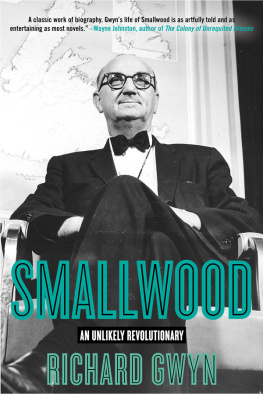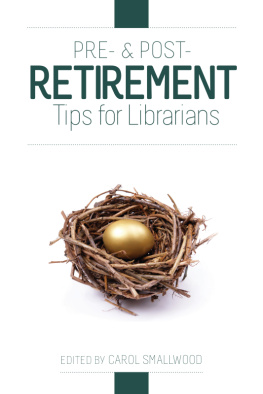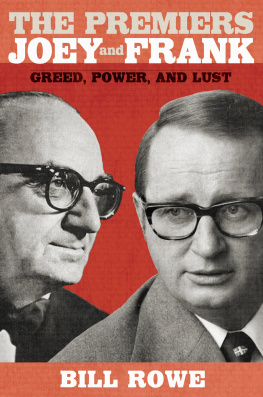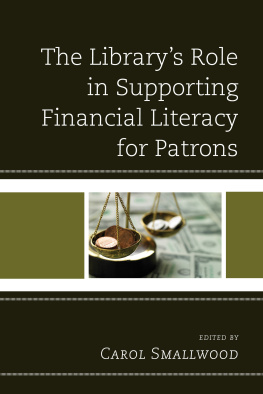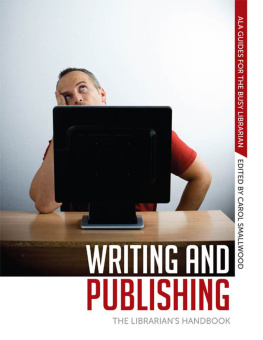Richard Gwyn - Smallwood: The Unlikely Revolutionary
Here you can read online Richard Gwyn - Smallwood: The Unlikely Revolutionary full text of the book (entire story) in english for free. Download pdf and epub, get meaning, cover and reviews about this ebook. year: 2015, publisher: Skyhorse, genre: Detective and thriller. Description of the work, (preface) as well as reviews are available. Best literature library LitArk.com created for fans of good reading and offers a wide selection of genres:
Romance novel
Science fiction
Adventure
Detective
Science
History
Home and family
Prose
Art
Politics
Computer
Non-fiction
Religion
Business
Children
Humor
Choose a favorite category and find really read worthwhile books. Enjoy immersion in the world of imagination, feel the emotions of the characters or learn something new for yourself, make an fascinating discovery.
- Book:Smallwood: The Unlikely Revolutionary
- Author:
- Publisher:Skyhorse
- Genre:
- Year:2015
- Rating:3 / 5
- Favourites:Add to favourites
- Your mark:
Smallwood: The Unlikely Revolutionary: summary, description and annotation
We offer to read an annotation, description, summary or preface (depends on what the author of the book "Smallwood: The Unlikely Revolutionary" wrote himself). If you haven't found the necessary information about the book — write in the comments, we will try to find it.
The extraordinary life of Joey Smallwood is the stuff of fictionliterally: Wayne Johnstons acclaimed novel, The Colony of Unrequited Dreams, draws heavily on this definitive biography. And no wonder! Set against a colorful background in stirring times it has, as its hero, a character whose career defied both convention and the odds. A one time pig farmer and ardent socialist-turned-union-buster Smallwood is best remembered as the man responsible for bringing Newfoundland into confederation with Canada.
A full ten years before Alaska and Hawaii became the 49th and 50th states of the union a massive British Dominion on the Eastern Seaboard was at a crossroads. Should they join the US as its 49th state? Maintain ties with the British via a British-led commission of government? Should they join Canada? Joey Smallwood, a well-known radio personality, writer and organizer at the time, led a spirited campaign in favor of joining Canada. With 52.3% of a controversial vote marred by sectarian tensions Newfoundlanders voted with Smallwood and the boundaries of Canada as we know them today were established. The first premier of Newfoundland, Smallwood ran Newfoundland virtually unchallenged for 23 years.
Smallwoods work experience was checkered, at best, but included stints as a contributor to socialist newspapers in New York and London. He was self-taught, and possessed the enthusiasm and wrong-headedness of the autodidact. As Gwyn shows, however, Smallwood possessed ambition of a rare order and utterly unconquerable self-confidence.
These qualities combined with unerring political instinct enabled Smallwood to drag a reluctant Newfoundland into union with Canada, and subsequently to impose his will over compliant colleagues and a vestigial opposition until he governed his island province with the near-absolute power of a despot. Like a despot, too, he countenanced corruption on a scale rarely equaled in Canada. His fall, no less than his rise to power, contains elements of pathos, farce, and pure, farfetched wonderfulness.
Richard Gwyn interviewed Smallwood extensively and enjoyed his subjects full co-operation. But this is in no sense an authorized biography. It is a balanced, informed, and deeply considered life of a unique political figure.
Richard Gwyn: author's other books
Who wrote Smallwood: The Unlikely Revolutionary? Find out the surname, the name of the author of the book and a list of all author's works by series.

